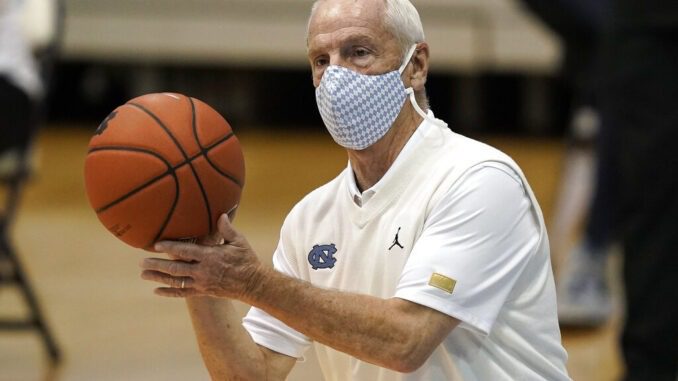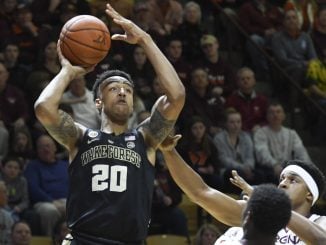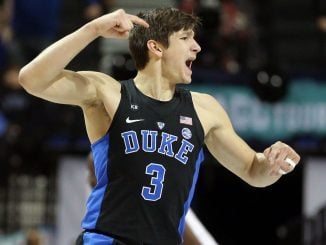
Duke coach Mike Krzyzewski created a stir last week when he openly questioned whether college basketball should continue playing during the coronavirus pandemic.
It was a comment that was met with immediate backlash, primarily because it came in the aftermath of an 83-68 loss to Illinois, the Blue Devils’ second loss in four games at Cameron Indoor Stadium this season.
As suspicious as the timing might have been, especially to members of the national media, Twitter trolls and at least one rival coach who has since apologized for openly questioning Krzyzewski’s motivation, the point is a valid one.
While the ACC has successfully managed to pull off a football season with only a handful of disruptions, attempting to play an indoor sport amid a spiking public health crisis has already proven to be a much more complicated pursuit.
“We’re just plowing through this,” the sport’s winningest coach said. “People are saying the next six weeks are going to be the worst. To me, it’s already pretty bad.
“On the other side of it, there are these vaccines that are coming out. By the end of the month, 20 million vaccine shots will be given. By the end of January or in February, another 100 million. Should we not reassess that, see just what would be best?”
Virtually every team in the nation, including those here in North Carolina, have already been affected either directly or indirectly by COVID-19.
Wake Forest hasn’t played a game since the day after Thanksgiving because of an outbreak within its program and won’t return to practice at least until Dec. 20.
NC State has just resumed basketball activities for the first time since two members of its traveling party tested positive the day after a win against UMass-Lowell on Dec. 3. Among the four games the Wolfpack has lost during its pause is Wednesday’s ACC opener at Louisville. The Wolfpack will play at Saint Louis on Thursday in a game announced Tuesday afternoon.
Krzyzewski’s Blue Devils have yet to experience any coronavirus issues of their own but have canceled all remaining nonconference dates because of problems at other schools on their schedule. North Carolina’s Roy Williams, when faced with a similar situation, scrambled to find a replacement opponent for his team to face.
The Tar Heels hastily arranged a game against NC Central last Saturday less than 48 hours after Elon announced it would be unable to play its previously scheduled game at Smith Center.
“The past couple of weeks have been very difficult,” first-year Wake coach Steve Forbes said. “No one, except the coaches and players within their respective programs, fully understands what each college basketball team is experiencing or has experienced over the past few months.”
Even those that have managed to stay COVID-free, at least to this point, have had to adjust — whether its rearranging schedules that were already hastily thrown together at literally the 11th hour, playing in empty arenas, or having to bond on the fly after going much of the offseason without being able to practice as a team or having the benefit of exhibition games, a handicap that has made things especially difficult for freshman-heavy teams such as Duke and UNC.
“This year has been different,” said. East Carolina coach Joe Dooley. Despite his team’s 5-0 start, he said he doesn’t “truly have a feel for where we are yet” because of the disjointed nature of the season.
As uncertain as things are on the court these days, simply getting to the games can sometimes be an accomplishment — especially when it involves travel to an away game far from home.
It’s an endeavor Dooley and his Pirates will experience for the first time this week when they head to Dallas for their American Athletic Conference opener at SMU.
“I don’t know what to expect traveling,” Dooley said. “We’re just going to put our masks on and let it roll.”
Regardless of the precautions, walking through airports, sitting on crowded planes and staying in hotels carries an inherent risk of infection during a time in which COVID-19 cases are reaching record levels.
It’s the reason Krzyzewski suggested putting the season on hold at least temporarily and extending later into the spring or early summer.
To this point, though, the NCAA Men’s Basketball Oversight Committee — which saw millions of dollars lost in television revenue because of the cancellation of last year’s tournament — has shown no interest in further tinkering with its postseason in 2021.
“I know the NCAA is worried about the endgame,” Krzyzewski said. “They’re not as worried about the game we’re playing right now.”
While not all of Krzyzewski’s coaching counterparts are on board with the idea of shutting things down, insisting that their players have told them they want to keep playing, most agree that there needs to be a higher level of caution as the season moves on.
“I have not seen all of Michael’s comments, but the comments that I saw made sense,” UNC’s Williams said of Krzyzewski. “It’s a strange time. It’s the most unusual time that I’ve ever seen, and it changes. It’s times we’re not used to, and we should probably take a different look at it than we did in July or June, some months ago.
“I have a tremendous amount of faith in Michael. I think he has a great concern and interest in what college basketball is and where it’s going.”



